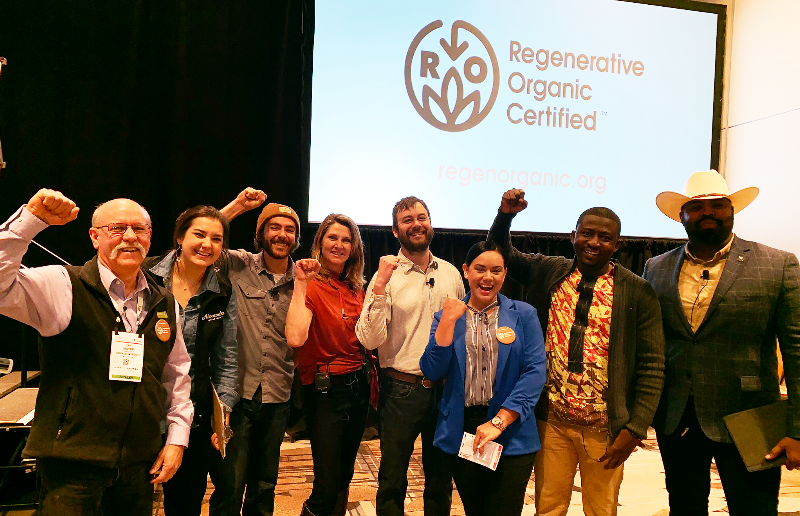Press Release FOR IMMEDIATE RELEASE Regenerative Organic Alliance Launches Journey to ROC™ Initiative in Partnership…

The good, the bad, and all that’s in-between.
Regenerative Organic Certified was not launched as a greenwashing campaign or marketing scheme. It was launched as an effort to address some of the most complex problems of our times. That is why we call this the Journey to Regenerative Organic Certification, not the Arrival at Regenerative Organic Certification. The process is challenging, enriching, and completely inspiring.
On March 8th, six pilot panelists joined us at Expo West from three hemispheres, and shared the stories of their Journey to Regenerative Organic Certified, pillar by pillar. As they shared a tiny glimpse into on-the-ground successes, they also offered up the gritty challenges they are facing. It was our request for them to share these side by side, and fully aligns with the transparency required to find the solutions that will move ROC forward.
What we know is that, as a global certification, it’s not all apples-to-apples across all three pillars of soil regeneration, animal welfare, and social fairness. For example:
- What’s the best way to develop a relevant, accurate soil testing requirement that applies equally well across hundreds of smallholders in India or Ghana as it does in North America?
- How do you reconcile animal welfare standards that prohibit the practice of branding livestock when this is legally required in many Western states in the US?
And for social fairness… We are creating solutions to reconcile the discrepancy of labor fairness at the farm level, as a standard can become complicated when we apply the logic across hemispheres.
- How do we fight egregious practices such as child labor in the global south while honoring the legacy of family farms in the global north, where children take part in the life-cycle of labor on farms across America?
- How do we reconcile farms that offer internships in an agricultural education program which includes stipends & housing in exchange for farm work but doesn’t meet the standard for a living wage?
All that said, there is also one of the most critical questions: In addition to keeping more records and undergoing more audits, will farmers have to bear the added costs of soil testing and certification?
These are some of the questions that require the sophisticated nuanced answers we are actively discovering with our Board of Directors, our partners at NSF, and you- the farmers, brands, and folks who will engage with the seal of Regenerative Organic Certified.
The most valuable tenet we have in the process of the ROC Pilot is this: We will continue to tend the standard as we tend the soil: as a living physical entity that responds to environmental forces. We will not cease our vision as we continue to work together towards solutions… and this includes your input.
So stay tuned, because we are not trying to move the needle, we are changing the record!
![]()
Elizabeth Whitlow
Executive Director, ROA
We are currently editing the Expo Panel video to share with all of you in the coming month, so please stay tuned! Get ready for regenerative organic agriculture’s positive influence on water capture through healthy soil, and exponential influence on biodiversity, including bird species (Garett Long boasted, Vanessa Alexandre exceeded, and Marshall Johnson from Audubon didn’t even need to say!).

About that General Mills 1M acres by 2030
(and other claims).
We are often asked for our response to broad claims and goals of other initiatives in regenerative agriculture. Here’s how we see it… It is going to take all of us to turn this mothership around. We need a diversity of efforts from every angle of agriculture to build back our soil. Period.
You will begin to see the term “regenerative” used in food marketing more and more over the next year, and there are many large companies and initiatives that are promoting and supporting regenerative agriculture at multiple levels. General Mills is one of them. We encourage you to keep your eye on these efforts, speak up, insist on transparency, insist on third-party verifiable claims and let them know of your support but also what other improvements they can make in these urgent times.
One major difference between other regenerative initiatives and ROC is that ROC is rooted in organic farming in the living crust of the earth. Regenerative Organic Certified also holds the highest bar across the three pillars- soil, animal welfare, and social fairness. It is our greatest hope that the largest companies will join us in these efforts as part of their programs in the nearer than further future.

Your questions. Answered.
Part of our challenge in creating this encompassing new certification is identifying where there is need for more clarity. For the next few newsletters, we are taking heed to your valuable questions. Keep shining your light through the cracks and in the corners.
Going International
Q: Will it be possible to certify from a non-US country like Chile? Can we help in something to get certification available in Chile? (add their excitement – we are farmers)
I would like to ask if there are plans to expand to Europe the ROC Pilot Program?
A: Absolutely. ROC is a global certification and we are currently onboarding certification agencies, including those with global reach. We will continuously be updating the list of approved certifiers on our website. If you do not see your certifier on our list, please ask your certifier to contact NSF to learn about the ROC accreditation requirements.
Money Matters & Paperwork:
Q: How will the process and cost of the ROC be different, and hopefully more accessible, to small farmers than all the hassle, paperwork, and expense of other certifications?
A: This is a big and often asked question. ROC is a high bar standard and is being tested out with the pioneering brands and farms in the ROC Pilot Program. We have a broad selection of brands and farmers in our pilot that produce over 20 types of commodities, grown on farms from 1 hectare to 10,000 hectares in nine countries. We will build on existing recognized certifications at the ROC add-on audits so that we eliminate duplication.
We recognize the leadership of smaller farms to educate their communities. They are the locus of where the good word of regenerative organic agriculture can begin. Brands who source from ROC farms have shown their willingness to put the resources forth to incentivize and reward these producers with price premiums, long term contracts and technical resources to help implement regenerative practices.
Regarding paperwork: There is additional paperwork required for any compliance programs with third party verification. It is a hassle, and we understand that. We can’t eliminate that component though as detailed records demonstrating practices result in improved accountability and traceability. We are very cognizant of the pain points and strive to align with other certifications to avoid unnecessary documents.
Carbon trading and other avenues to bring benefits to farmers:
Q: What opportunities are there for payments for ROC ecosystem services?
A: Brilliant question! There are a growing number of funds that reward growers for the valuable ecosystem services they provide to bio-regions and communities. We see opportunities in the developing carbon markets such as can be seen in California, Canada and Australia for example. The regulatory framework and policies will vary by country so this is an evolving area to study. The carbon trading market has been mostly inaccessible for small farms with a high barrier to entry, but new technologies like blockchain may change this. We are also keen on connecting these dots. For this reason, we have worked diligently to ensure that the Key Performance Indicators we collect at audits are robust and credible so that ROC growers will be in position to tap these funds.
Teach the children well:
Free Community Screenings April 2, 3 & 4!
We are so thrilled for John and Molly of Apricot Lane Farms, whose incredible Journey to Regenerative has been fully documented into the feature-length film, Biggest Little Farm. Learn how we can truly transform and rewild our agricultural spaces to once again support all forms of life in this beautiful and mesmerizing documentary that will draw the sweetest tears of optimistic pragmatism. A true inspiration.
Advance screenings are already set to take place across 50 major markets from April 2nd-4th with additional dates throughout April available upon request.
A generous grant has made it possible for us to offer these in-theater screenings FREE to schools that sign up by end of March. There are only a few days left to sign up- get on it and share this incredible true story with your community!